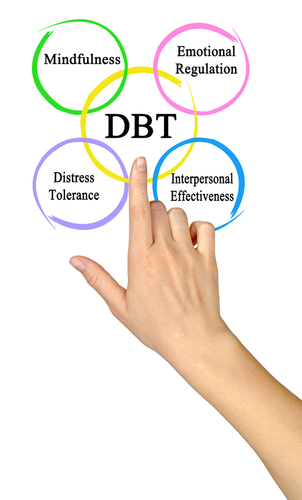Dialectical behavior therapy (DBT) is an evidence-based psychotherapy that is founded on the principals of cognitive behavioral therapy (CBT) and blends Eastern mindfulness techniques (e.g., awareness, mindfulness, and attentiveness to current situations and emotional experiences) to encourage acceptance and change. Psychologist Marsha M. Linehan developed DBT in the late 1980s as a means to more effectively treat chronically suicidal individuals diagnosed with borderline personality disorder (BPD). The purpose of DBT is to provide clients with new skills to manage painful emotions and reduce conflicts in relationships. The therapeutic approach consists of three different therapy settings, including weekly individual psychotherapy sessions, weekly group DBT skills therapy sessions, and as-needed phone coaching to provide additional support between the weekly individual and group sessions.
Four DBT Modules
DBT focuses on providing therapeutic skills in four areas, known as the four modules, that make up the pillars of DBT. It is impossible to distinguish the most useful DBT modules, as no single module is more useful than another. Each module focuses on distinct and specific skills that build upon each other and are integral to one’s healing process. Hence, DBT is most effective when all four modules are implemented together. To fully glean the importance of each module it is helpful to gain a basic understanding of each module.
1. Core Mindfulness: Focusing Skills
This module focuses on teaching an individual an array of skills to focus their mind and attention. Through learning and implementing the DBT mindfulness skills, individuals can practice being fully present and aware in the moment. Skills during this module help individuals learn to slow down and focus on mindfully acknowledging and experiencing emotions without reacting impulsively and/ or destructively. It teaches skills to help individuals avoid taking things personally, garner a better understanding of their emotions, become active listeners, and learn to sit with emotions instead of trying to ignore, expel, or dismiss them.
2. Distress Tolerance: Crisis Survival Skills
The purpose of the distress tolerance module is to help individuals learn tools and techniques to get through challenging situations when emotions are heightened. This module teaches individuals four sets of crisis survival skills to assist in finding meaning in, accepting, and tolerating distress some of which include self-soothing, distracting, and thinking of pros and cons. Learning these skills helps an individual learn to acknowledge, process, and integrate emotions and situations in a way that is non-evaluative and nonjudgmental.
3. Emotion Regulation: De-escalation Skills
This module teaches skills surrounding emotional regulation, as well as providing education regarding the function of emotions. It helps individuals learn to experience strong emotions while simultaneously reducing the intensity of the emotions without acting on them. In this module individuals learn a variety of helpful skills, such properly identifying and labeling emotions, increasing positive emotional events, increasing mindfulness to current emotions, identifying obstacles to changing emotions, and applying distress tolerance techniques.
4. Interpersonal Effectiveness: Social Skills
This module teaches skills to help individuals learn how to communicate with others effectively and authentically. The interpersonal effectiveness skills involve helping individuals identify and understand their own needs in a relationship. These skills also help an individual learn to cultivate, engage, and maintain healthy relationships with others that enable one’s needs to be met. This includes advocating for one’s needs and communicating in way that is non-damaging, assertive, maintains self-respect, and strengthens relationships.
Disclaimer:
The information above is provided for the use of informational purposes only. The above content is not to be substituted for professional advice, diagnosis, or treatment, as in no way is it intended as an attempt to practice medicine, give specific medical advice, including, without limitation, advice concerning the topic of mental health. As such, please do not use any material provided above to disregard professional advice or delay seeking treatment.


